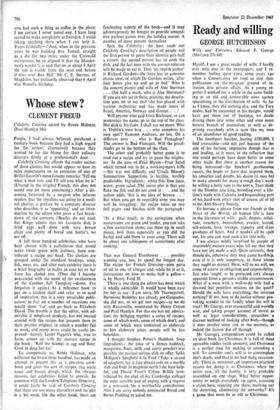Ready and willing
GEORGE HUTCHINSON
Myself, I am a great reader of wills. I hardly ever miss one in the newspapers, and I re- member feeling quite cross some years ago when a Conservative MP tried to stop their publication on the mistaken ground of in- trusion into private affairs. As a young re- porter I worked for a while in the same build- ing as an old and honourable news agency specialising in the distribution of wills. As far as I know, they did nothing else, and the Tory zealot, had he succeeded in his designs, would have put them out of business, no doubt driving them into some other and even more bizarre branch of journalism, as well as de- priving everybody with a taste like my own of an abundance of good reading.
The Southport butcher, leaving f180,000, I find irresistible—and not just because of the size of his fortune, impressive though that is and leading, as it must, to the reflection that one could perhaps have done better in some other trade. But there is another reason for being interested—the butcher's posthumous causes, the hopes or fears that inspired them, his anxieties and doubts, his desire (it may be) to make amends for many a rough day's work by willing a hefty sum to the RSPCA. Then think of the Dundee jute king, brooding over a life- time's trade with Calcutta and bequeathing part of his hard-won estate (not of course all of it) to the Anti-Slavery Society.
To borrow a phrase from our friends at the News of the World, all human life is here in the literature of wills : guilt, despair, solici- tude, treachery, benevolence, avarice, hatred, self-esteem, love, revenge, rapacity and sheer goodness of heart. And it needn't all be spelt out, for you can read such a lot into wills.
I am always mildly surprised by people of reasonably mature years who tell me that they have not yet made a will. Quite seriously, they should do, otherwise they may cause hardship, even if it is only temporary, to those whom they ought to protect. Here, will or no will, we come of course to obligation and responsibility. Just who 'ought' to be protected isn't always apparent from a person's visible circumstances. What if a man with a well-to-do wife had a devoted but penniless mistress on the quiet? Should the wife have everything, the mistress nothing? If not, how to do justice without pro- voking scandal in the family when the will is read? Mr George, ever resourceful and worldly wise, and taking proper account of moral as well as legal considerations, prescribes a discreet method- of looking after both—though it does involve some risk to the mistress, as indeed the liaison did all through.
Mr George's compendium could be called an ideal book for Christmas. It is full of these agreeable riddles (with answers), and Christmas is a perfect time for making or amending a will. To consider one's will is to contemplate one's death, and that is no bad thing occasion- ally. There is, moreover, an important practical reason for doing it at Christmas, when the entire cast, all the family, is very probably assembled on one stage. What better oppor- tunity to weigh everybody up again, assessing a claim here, rejecting one there, marking out the deserving, eliminating the unworthy? It's a game that must be as old as Christmas.


































 Previous page
Previous page